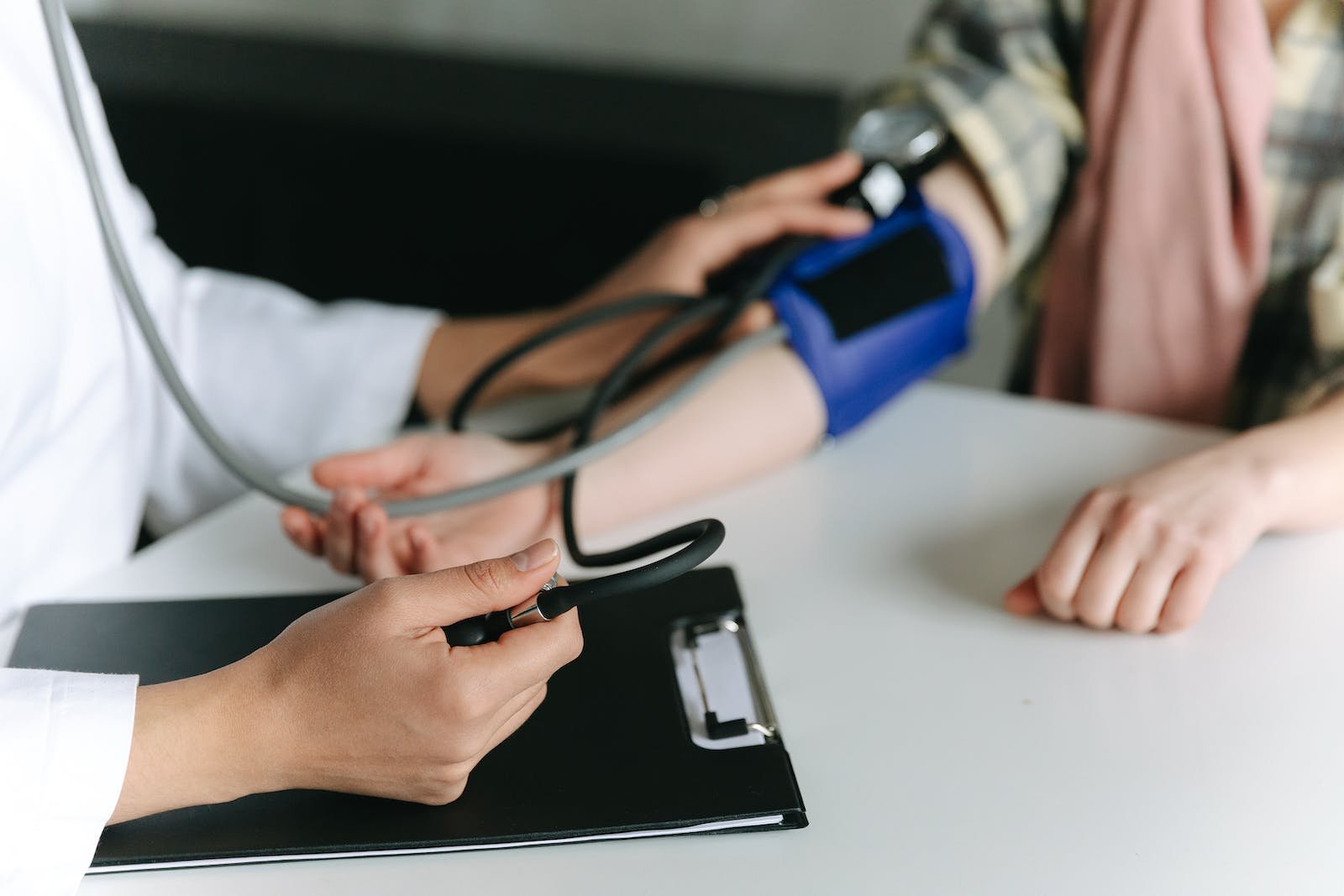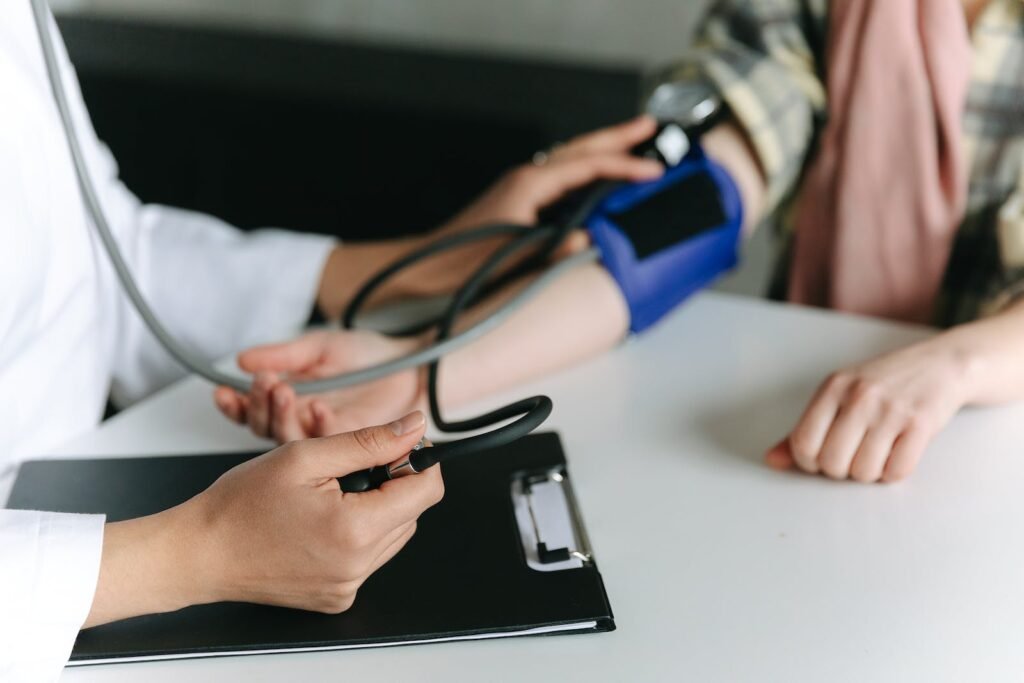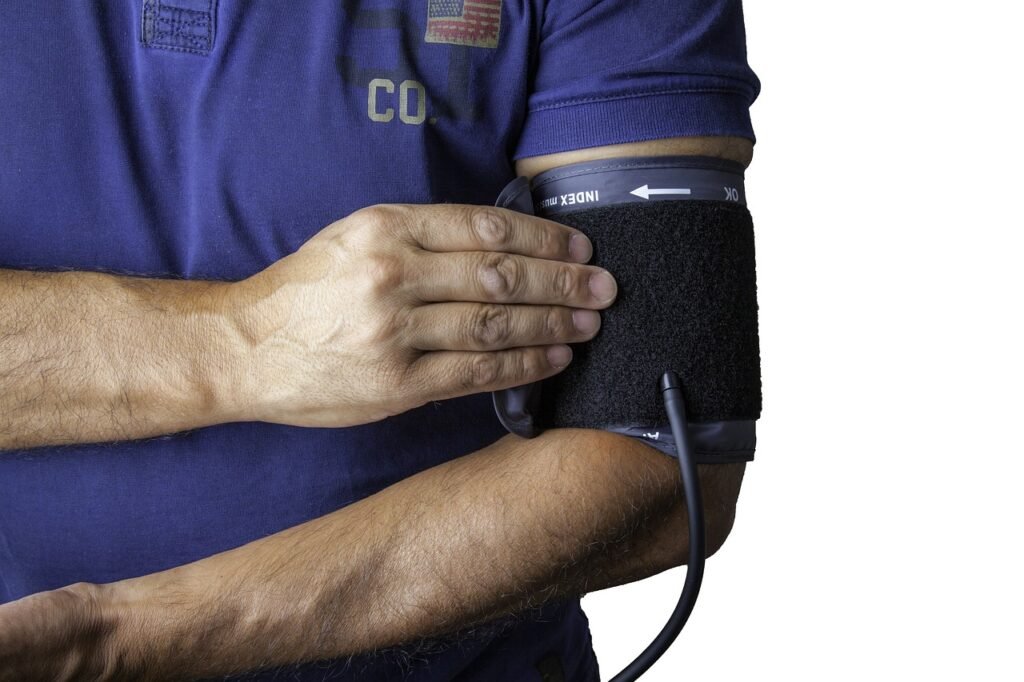Get our FREE E-Book HERE - 120 TIPS for Losing Weight & Bonus Tips for Postpartum Weight Loss & Dad’s Postpartum Experience
Intermittent Fasting and Blood Pressure Benefits


Intermittent fasting has gained popularity as a dietary trend with potential benefits for blood pressure management. Studies have shown that various fasting methods can lower blood pressure, with one study even reporting a significant decrease of 11 points in participants’ blood pressure levels.
The relationship between intermittent fasting and blood pressure is still being investigated, but researchers speculate that mechanisms such as caloric restriction, relaxation of the nervous system, and effects on the gut microbiome may contribute to these positive outcomes.
If you’re curious about the effect of intermittent fasting on your blood pressure, it’s essential to discuss your fasting plans with a healthcare provider. This is especially important if you’re currently taking blood pressure medications or have low blood pressure.
Your healthcare provider can guide you on how to approach fasting safely and effectively while taking these factors into account.
Key Takeaways:
- Intermittent fasting has shown benefits for blood pressure management.
- Various fasting methods can potentially lower blood pressure.
- The mechanisms behind this relationship are still being researched.
- Consult a healthcare provider before incorporating fasting into your routine.
- Monitor your blood pressure levels regularly and make adjustments as necessary.
How Intermittent Fasting Affects Blood Pressure Medication
If you are taking blood pressure medication, it is important to discuss your fasting plans with your healthcare provider. Fasting can significantly lower blood pressure, and there may be a need to adjust your medication dosage.
It is crucial to carefully monitor your blood pressure levels while fasting to ensure it does not drop too low, leading to symptoms such as lightheadedness, dizziness, fatigue, and fainting. Individuals with low blood pressure or certain medical conditions may be at higher risk of complications from fasting.
It is always best to seek guidance from a healthcare professional to ensure safe and effective fasting while taking blood pressure medication.
Recent scientific studies have explored the relationship between intermittent fasting and blood pressure medication. One study found that fasting for 16 hours a day resulted in a significant reduction in blood pressure levels among participants on blood pressure medication [

Another study demonstrated that fasting, particularly alternate-day fasting, was associated with improved blood pressure control
Monitoring Blood Pressure Levels
During intermittent fasting, it is crucial to monitor your blood pressure levels regularly. This can be done using a home blood pressure monitor or by visiting your healthcare provider for regular check-ups. If you notice any significant changes in your blood pressure, such as a drastic drop, it is important to consult your healthcare provider immediately. They can guide you on adjusting your medication dosage or suggest alternative fasting methods that may be safer for you.
“Discussing your fasting plans with your healthcare provider is of utmost importance, especially if you are taking blood pressure medication.”
Individuals with low blood pressure or certain medical conditions, such as diabetes or kidney disease, should exercise caution when considering intermittent fasting. Fasting may not be suitable for everyone, and it is vital to prioritize your overall health and well-being above all else. Your healthcare provider will be able to assess your specific circumstances and provide personalized advice on incorporating fasting into your routine while taking blood pressure medication.

In summary, if you are taking blood pressure medication, it is crucial to consult your healthcare provider before starting an intermittent fasting regimen. Fasting can affect your blood pressure levels, and adjustments to your medication may be necessary. Regular monitoring of blood pressure and open communication with your healthcare provider are key to ensuring safe and effective fasting practices while taking blood pressure medication.
Intermittent Fasting and Blood Pressure Reduction: How Long to Fast?
How long to fast to reduce blood pressure may vary depending on the individual. Studies have shown that fasting periods of up to 16 hours or longer can have a positive impact on blood pressure. However, it is important to note that the effects of fasting on blood pressure may be temporary, with blood pressure returning to its usual levels after fasting.
To determine the most suitable fasting duration for your specific needs, it is recommended to work with a healthcare provider. They can assess your overall health and provide guidance based on your medical history and current condition. Additionally, it is important to monitor your blood pressure levels throughout the fasting period to ensure that it remains within a safe and healthy range.

One study found that people who fasted during Ramadan, had lower blood pressure, no matter how their weight or body water content fluctuated.
It is advisable to start with shorter water fasting periods and then gradually increase the duration based on your tolerance and overall health status. This approach allows your body to adapt to the fasting process and minimizes the likelihood of adverse effects. It is important to note that water fasting should always be done under the guidance and supervision of a healthcare professional.
Expert Advice: “When considering water fasting for blood pressure management, it’s crucial to consult with a healthcare professional. They can assess your individual health needs, provide guidance, and monitor your progress throughout the fasting period.” – Dr. Jane Smith, Cardiologist
It’s important to understand that water fasting may not be suitable for everyone. Individuals with underlying medical conditions, such as diabetes or kidney disease, or those taking medications should exercise caution and seek medical advice before attempting water fasting. Your healthcare provider will be able to determine the safety and feasibility of water fasting for you.
Remember, managing blood pressure requires a holistic approach that combines healthy lifestyle choices, including a balanced diet, regular physical activity, stress management, and potentially fasting under medical supervision. Monitoring your blood pressure levels regularly and working closely with your healthcare provider is essential for effective blood pressure management.
Summary:
- Water fasting may help lower blood pressure, but the duration needed to see results varies from person to person.
- Research studies have shown the benefits of shorter water fasting periods, such as 24 hours or a few days, on blood pressure.
- Consult with a healthcare professional before attempting water fasting, especially if you have underlying medical conditions or take medication.
- Gradually increase the duration of water fasting based on your tolerance and health status.
- Regularly monitor your blood pressure levels and work closely with your healthcare provider for safe and effective blood pressure management.
Click here for more information on Intermittent Fasting
Conclusion
Intermittent fasting has emerged as a promising strategy for blood pressure management. Numerous studies have demonstrated a significant decrease in blood pressure with various fasting methods.
These improvements can be attributed to the combination of caloric restriction, the relaxation of the nervous system, and the impact on the gut microbiome.
However, it is crucial to consider individual factors, such as medication use and overall health status, when incorporating fasting into your routine. To ensure safe and effective fasting practices, it is highly advised to consult with a healthcare provider. They can provide personalized guidance and monitor your progress to make any necessary adjustments to your fasting plan.
Regular monitoring of blood pressure levels is essential during fasting periods. This will help you gauge the effects of fasting on your blood pressure and ensure it remains within a healthy range. Remember that the duration of fasting required to see a reduction in blood pressure may vary from person to person.
Some studies have suggested fasting periods of 16 hours or longer, but it is important to work with your healthcare provider to determine the most suitable duration for your specific needs.
Incorporating water fasting, where you consume only water for a set period, may also hold potential for lowering blood pressure. However, it is crucial to approach water fasting with caution.
Start with shorter fasting periods, such as 24 hours or a few days, and gradually increase the duration based on your tolerance and medical guidance. Consulting with a healthcare professional is especially important if you have any underlying medical conditions or are taking medications.
FAQ
Can intermittent fasting lower blood pressure?
Yes, intermittent fasting has been shown to have benefits for blood pressure management. Studies have indicated that various fasting methods can lead to a significant decrease in blood pressure.
How does intermittent fasting affect blood pressure medication?
If you are taking blood pressure medication, it is important to discuss your fasting plans with your healthcare provider. Fasting can lower blood pressure, and adjustments to medication dosage may be necessary to maintain optimal blood pressure levels.
How long should I water fast to lower blood pressure?
The duration of fasting required to effectively reduce blood pressure can vary. Studies have shown that fasting periods of up to 16 hours or longer can have a positive impact on blood pressure. Working with a healthcare provider is recommended to determine the most suitable fasting duration for your specific needs.
Can intermittent fasting have other positive effects on health?
Yes, intermittent fasting has been shown to have positive effects on cholesterol levels, weight loss, blood sugar control, and inflammation, in addition to its potential benefits for blood pressure management.








